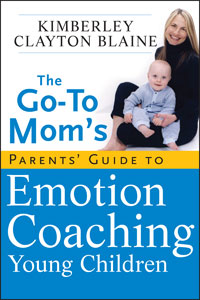
Why kids need to express their feelings
You can teach your children how to master their frustrations at a very early age, says Kimberley Clayton Blaine, a Los Angeles-based national parenting expert. Blaine, a licensed family and child therapist who specializes in working with young children, says kids who aren’t able to freely express themselves may grow up with issues that can prevent them from having healthy relationships and successful careers. To avoid such issues, she advises parents to foster emotional intelligence through emotion coaching. Blaine practices emotion coaching with her kids, ages 5 and 7, and offers insight to the technique below.

How can your book, The Go-To Mom’s Parents’ Guide to Emotion Coaching Young Children help parents?
Kimberley Clayton Blaine: Parents learn how to teach their kids to regulate their emotions so they can recognize and express their various feelings appropriately. The idea is to help your child understand and communicate his feelings according to his developmental abilities. It’s particularly important to help him express his feelings when they’re overwhelming.
You want to help your child learn about social behavior and the world around him by being a guide and having a deep understanding of your child. Emotion coaching is a way of life and it will strengthen your relationship with your child and teach him how to be responsible, adaptable and how to relate well with his peers. Your kids will learn the importance and impact of their own emotions and how they can identify and label their feelings and use them for their benefit.
Give bribes and charts the boot
What do you think parents of young kids need help with today?
 Blaine: Despite good intentions, today’s parents still rely on what is familiar and comfortable, which means they engage in some sort of outdated parenting techniques used by their parents or in some cases, in opposition to their parents. Hitting, yelling and threatening are outmoded theories of child rearing. They’re things we don’t even do with our pets, so why would anyone believe they’re OK to do to our children? Behavior charts, bribes and rewards, though more benign, are not the answer either.
Blaine: Despite good intentions, today’s parents still rely on what is familiar and comfortable, which means they engage in some sort of outdated parenting techniques used by their parents or in some cases, in opposition to their parents. Hitting, yelling and threatening are outmoded theories of child rearing. They’re things we don’t even do with our pets, so why would anyone believe they’re OK to do to our children? Behavior charts, bribes and rewards, though more benign, are not the answer either.
The meaning of “discipline” is to guide or teach. When we punish our children we often leave out the guidance, which means we don’t get the results we want.
Emotion coaching is a humane and loving way of disciplining your child. It’s logical and gentle as opposed to old-fashioned aggressive discipline that isn’t effective and doesn’t feel good to anyone.
Get past your issues
How can parents use the technique emotion coaching for feel-good and effective disciplining?
Blaine: Establish a healthy line of communication with your child early. Communicate your thoughts and feelings with her often.
Don’t let your issues affect how you discipline. Know your hot buttons so you don’t react impulsively. It’s never productive or healthy to give into your anger and take it out on your children. Use encouragement, instead of “Don’t do this,” or “Because I said so.” Children love to please parents and if they know you’re happy, they’ll work harder to do the good behavior next time.
More emotion coaching tips
- Take “thinking time” and ask your child to ponder what she can do differently so she can be an active part of her discipline.
- Suggest a good behavior in place of a bad one. For example, if you tell your son there’s no running inside, follow up with saying he can run and jump all he wants outside and offer to go out and play with him.
- Take about your feelings. For example, explain that their fighting makes you sad so they understand the effect their behavior has on others, which in turn makes them more likely to react differently in the future.
- Acknowledge and validate her feelings while setting limits. Let her know you’re not just giving out a punishment — you realize that she’s experiencing emotions and you understand.
![]() Tell us
Tell us
How do you foster emotional intelligence in your kids? Please share your thoughts and stories in Comments below.
Read more on how to discipline
Evaluating your discipline techniques
What role does discipline play in parenting?
5 Reasons inner strength is a must for raising children